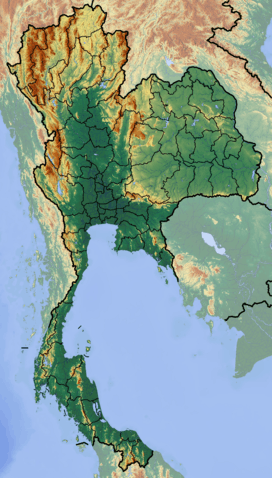Chaloem Rattanakosin National Park
| Chaloem Rattanakosin National Park | |
|---|---|
| อุทยานแห่งชาติเฉลิมรัตนโกสินทร์ | |
|
IUCN category II (national park) | |
 Park location in Thailand | |
| Location | Kanchanaburi Province, Thailand |
| Nearest city | Kanchanaburi |
| Coordinates | 14°47′49″N 99°10′54″E / 14.79694°N 99.18167°ECoordinates: 14°47′49″N 99°10′54″E / 14.79694°N 99.18167°E |
| Area | 59 km2 (23 sq mi) |
| Established | February 1980 |
| Governing body | Department of National Parks, Wildlife and Plant Conservation |
Chaloem Rattanakosin National Park (Thai: อุทยานแห่งชาติเฉลิมรัตนโกสินทร์), also known as Tham Than Lot National Park, is a national park in Kanchanaburi Province, Thailand. The park, featuring mountains, caves and waterfalls, is part of the Western Forest Complex protected area.
Geography
Chaloem Rattanakosin National Park is located 97 kilometres (60 mi) north of Kanchanaburi town in Nong Prue District. With an area of 59 square kilometres (23 sq mi), it is the smallest park in Kanchanaburi Province.[1][2]
The highest peak of the park's mountains is Kam Pang with a height of 1,260 metres (4,130 ft).[1]
History
Artefacts and human remains, thought to be from invading Burmese soldiers at end of the Ayutthaya Kingdom period, have been discovered in the park.[1]
On 12 February 1980, Chaloem Rattanakosin was designated Thailand's 17th national park.[1][2]
Attractions
The park's main attractions are its cave systems. 300 metres (980 ft) long Tham Than Lot Noi features many large stalactites and stalagmites. Tham Than Lot Yai also features stalactites and stalagmites in addition to being a site where ancient skeletal remains and weapons have been found.[1]
Chaloem Rattanakosin also features some waterfalls. Than Thong is a waterfall of 15 levels. Than Ngoen is a smaller waterfall of seven levels.[2]
Flora and fauna
The park's forests are dry evergreen, deciduous and bamboo forest.[1]
Animal species include leopard, banteng, gaur and gibbon. Bird life includes oriental pied hornbill, francolin, Tickell's blue flycatcher and coppersmith barbet. A notable inhabitant of the park is a rare barking tree frog, whose croak resembles a dog's bark.[1]